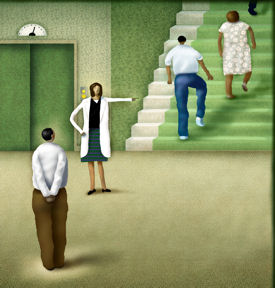Time neither heals nor absolves after romantic involvement
Considering a sexual relationship with a former patient, however brief the doctor's visit, raises issues after a romantic break-up.
A primary care physician working a shift in the walk-in unit of his medical center sees a woman whose regular physician is out of town. She comes in for a refill of zolpidem tartrate, which she is taking for insomnia brought on by several life stresses. She is otherwise completely healthy, and after confirming that her primary doctor has prescribed it, the physician refills her medication for a few days until the other physician returns. The physician engages the patient in a brief discussion of the life stresses contributing to her insomnia, but no physical exam is performed.
Several weeks later the physician meets the patient at a social gathering of mutual friends and she invites him to dinner. He initially refuses, saying he can't because he has seen her as a doctor. She laughs, finally convincing him that no ongoing physician-patient relationship whatsoever exists. A romantic/sexual relationship ensues. Several months later they break up, and the next week she files a complaint with the medical center alleging that the physician exploited her vulnerability. She says she must transfer her care to another institution because the possibility of seeing this physician, or one of his colleagues she met while involved, is so unsettling.
Commentary
A sexual relationship with a current patient is unequivocally forbidden in all codes of medical ethics, going back to the Hippocratic Oath: “In every house where I come I will enter only for the good of my patients, keeping myself far from all intentional ill-doing and all seduction and especially from the pleasures of love with women or with men, be they free or slaves.”
Whether a sexual relationship with a former patient is ever ethically permissible is a more controversial question. The closer in time, the more intimate (physically and emotionally) the professional caregiving interactions, and the more vulnerable the patient, the more ethically problematic a subsequent relationship becomes.
ACP's Ethics Manual states that “A sexual relationship with a former patient is unethical if the physician ‘uses or exploits the trust, knowledge, emotions or influence derived from the previous professional relationship.’” Applying this in practice, however, can be exceedingly difficult. Few (if anyone) would consider it ethically appropriate for a physician to initiate an intimate personal relationship immediately after seeing the patient. However, is it a breach of ethical standards if the content of their discussion about life stresses was minimal and the subsequent social gathering described here happened many years later?
Ethical standards from ACP, the American Medical Association and others focus (properly) on the possible patient exploitation. But there are clinical and moral dangers for physicians if our profession does not unambiguously reject the possibility that a clinical interaction might lead to a romantic relationship.
Patients cannot feel completely secure in exposing themselves physically or emotionally to a doctor if they believe that it is even remotely possible that the physician is wondering about one day becoming romantically involved. But physicians also are human. We as physicians must remain closed to even the possibility of becoming romantically involved with a patient in order to approach all patient encounters in an entirely professional manner.
If a patient and a physician disagree about whether an intimate relationship involved exploitation of an earlier professional interaction, then with few (but not zero) exceptions the patient's judgment should be the bottom line. If I were part of a disciplinary committee reviewing this case, I would feel that I had no choice but to conclude that there was a violation of professional standards. To do otherwise would show insufficient seriousness in upholding strict professional limits. I would do this with some discomfort, because such a conclusion would likely mean that on future applications for licensure or credentials the physician would have to report that he has been the subject of disciplinary action and explain the details.
It's impossible to draw exact boundaries between acceptable and unacceptable behavior in this area. I might, for example, reach a different conclusion if the clinical interaction involved a minute or two removing a splinter, rather than a discussion (however brief) of the patient's emotional stresses.
As a practical matter, physicians should assume that any prior physician-patient relationship is incompatible with a subsequent sexual relationship. But we can all imagine exceptions where the relationship was trivial and/or sufficiently distant in time. For these, the best we can do is to follow the advice of the College's Ethics Manual: “Because it may be difficult for the physician to judge the impact of the previous professional relationship, the physician should consult with a colleague or other professional before becoming sexually involved with a former patient.”
Follow-up
In reviewing the case, the medical center's disciplinary committee determined that the physician, while highly regarded by all of his colleagues and never the subject of any prior complaint, had violated ethical standards of professionalism. He was placed on probation for one year and required to undertake study of codes of professionalism.




